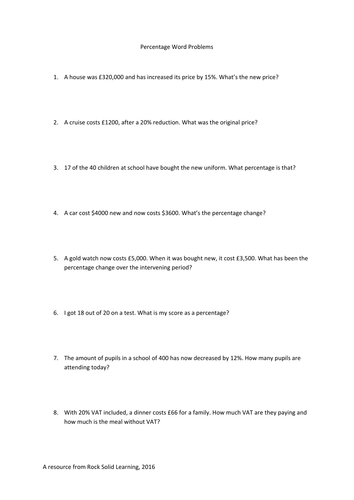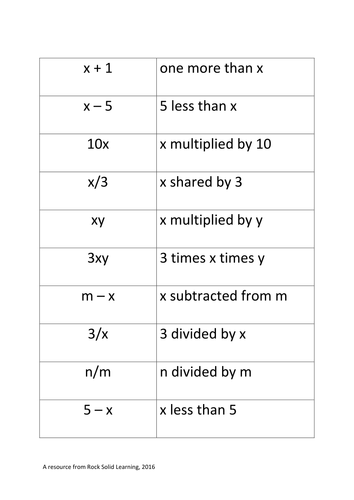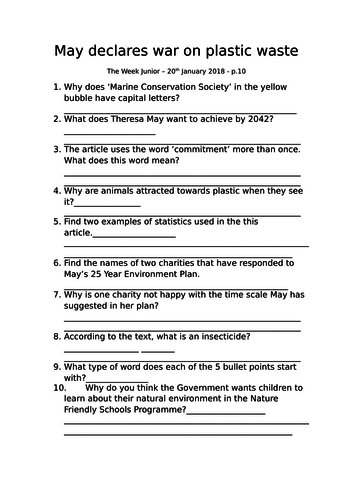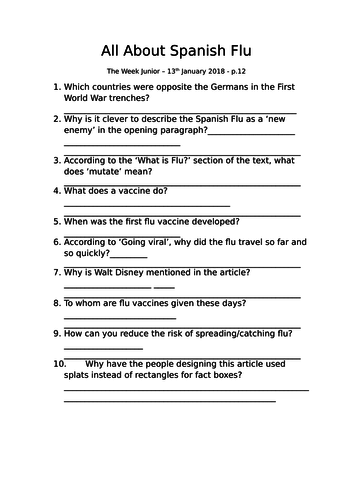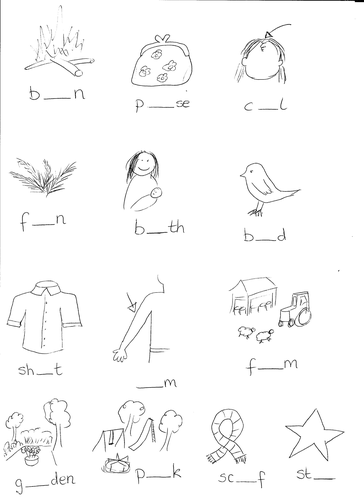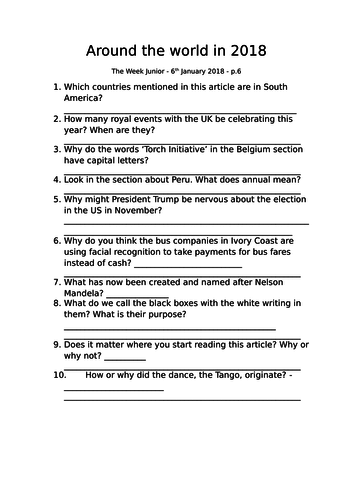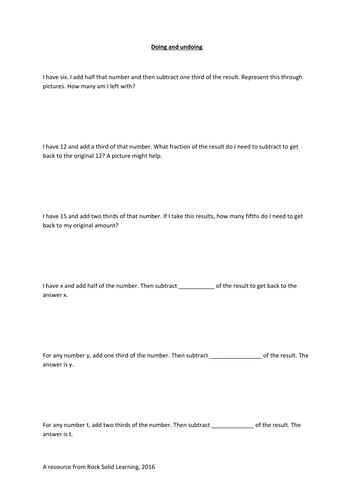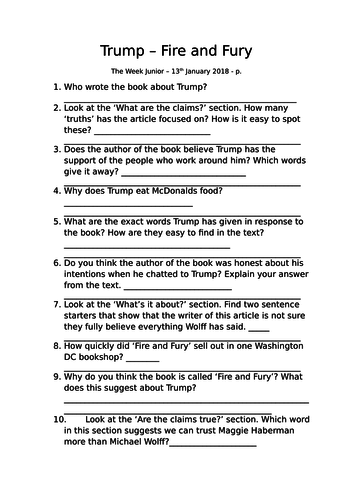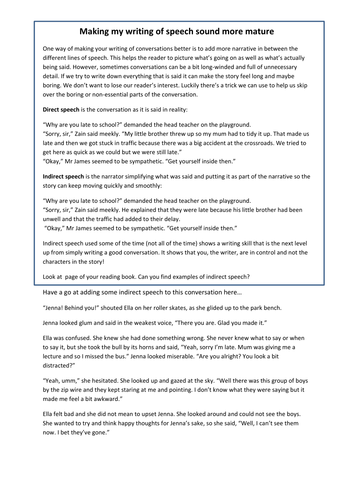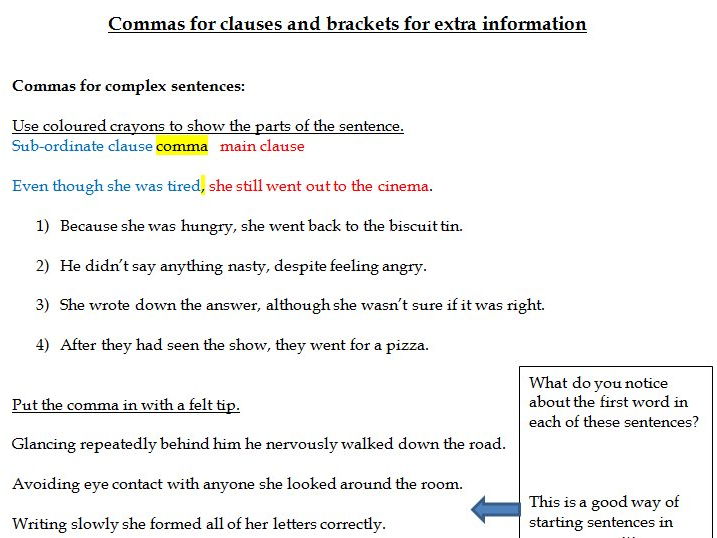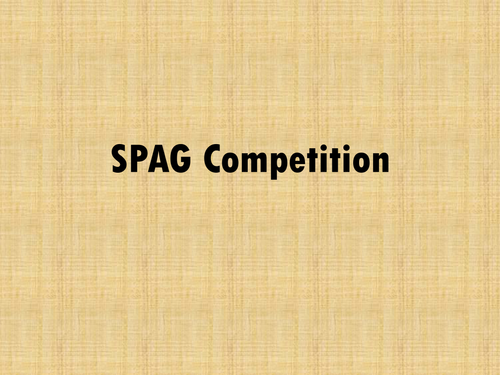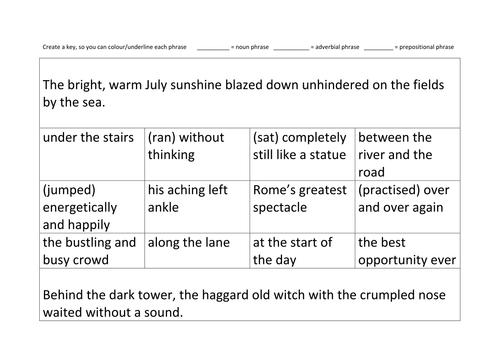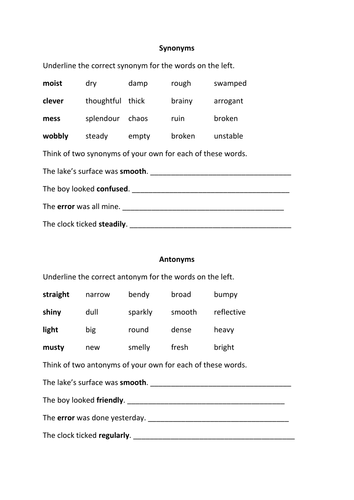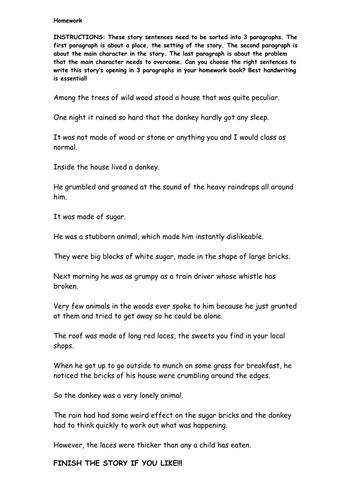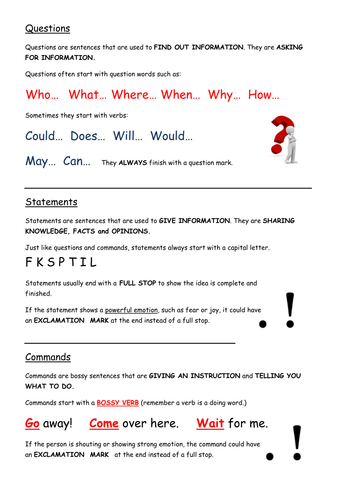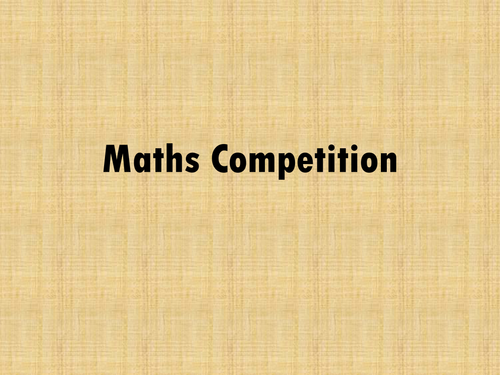46Uploads
41k+Views
16k+Downloads
All resources

Algebraic expression into words
A matching activity where pupils need to match an algebraic expression e.g. xy into words e.g x multiplied by y.

Reading Comprehension - The Week Junior - 20.01.18 - War on plastic waste
If your children read The Week Junior, get them to read the ‘May declares war on plastic waste’ article on p.10 in the 20th January 2018 edition. Follow it up with this quiz which is based mainly on reading comprehension skills. 10 questions. Great for morning work or guided reading.

Reading Comprehension - The Week Junior - 13.01.18 - Spanish Flu
If your children read The Week Junior, get them to read the ‘All about Spanish Flu’ article on p.12 in the 13th January 2018 edition. Follow it up with this quiz which is based mainly on reading comprehension skills. 10 questions. Great for morning work or guided reading.

Choosing between ar and er/ir/ur sounds
Some basic pictures with words underneath so that children can fill in the correct vowel sound. I had taught ‘ar’ in a recent lesson and er/ir/ur in this lesson, so I wanted something that would practise current learning but also revise previous learning.

The Highwayman Unit - 5 sessions
This document has ideas for splitting The Highwayman into five sections with a follow up activity for each. These include a character sketch, a news report, a diary entry etc. An example of each of the follow up activities is given, written by one of my students, which you could share as model for your students. There is a basic outline of ideas on the document but you may wish to make your own powerpoints/extra resources.

Reading Comprehension - The Week Junior - 06.01.18
If your children read The Week Junior, get them to read the ‘Around the world in 2018’ article on p.6 in the 6th January 2018 edition. Follow it up with this quiz which is based mainly on reading comprehension skills. 10 questions. Great for morning work or guided reading.

Doing and undoing (algebra, proportions and fractions)
If I have six sweets and increase them by a half, what fraction would I have to reduce the result by to get back to the original 6 sweets?
This resource was made as a way of explaining a KS3 exam question I found, which used this idea but with x amount of sweets.

Reading Comprehension - The Week Junior - 13.01.18 - Trump
If your children read The Week Junior, get them to read the President Trump article on p.2 in the 13th January 2018 edition. Follow it up with this quiz which is based on reading comprehension skills. 10 questions. Great for morning work or guided reading.

The importance and use of direct and indirect speech (reported speech)
This is not simply an activity of changing one to the other. The focus here is about how to make your writing more mature. The first two thirds of the worksheet are an explanation of how indirect speech can be used to avoid the narrator relaying every part of a conversation. It warns against long, tedious and even boring conversations, showing how indirect speech can speed up the narrative to keep the reader interested and the author in control.
The last third of the sheet shows a conversation using direct speech and here the pupils should be challenged to seek out the more important and less important parts in order to turn some of the conversation into indirect speech.

Commas for clauses worksheets (subordinate, embedded, relative, brackets)
This resource comprises two differentiated two-sided worksheets. The first looks at identifying main and subordinate clauses, using ~ing words at the start of a subordinate clause, extending sentences with 'which', inserting brackets around clauses as a way of introducing embedded clauses. It also sees whether they can spot/identify relative clauses and relative pronouns.
The second (higher) double-sided worksheet looks at writing sentences with subordinate clauses (using conjunctions, ~ing words and 'which'). On the second side, it gives examples of embedded relative clauses and then asks the pupil to complete more sentences that have already been started.
I used this for homework and revision after the Y5/Y6 pupils had already been taught the main concepts and sentence constructions.

SPAG competition quiz for KS2 Year 6 SATs revision
This quiz is ideal for two teams of between 4 and 8 but could probably be played with larger groups. It has four rounds including a buzzer round and speed round. There are questions that require team work and some that rely on every member of the team individually. Topics focus mainly on word classes, tenses, punctuation, synonyms and antonyms, clauses, phrases and pronouns.
Enjoy!

Identifying different phrases (noun phrases, adverbial phrases and prepositional phrases)
The one side of the sheet explains that phrases are unlike clauses in that they have no verbs. It then explains what the three different types of phrases are and gives examples of each.
On the second side of the sheet, there are twelve examples of phases that need to be coloured/highlighted/underlined to show which type of phrase they are. Then there are two sentences that involve all three types of phrases and these too need breaking down into the different phrases.

Synonyms and Antonyms
There are four activities here.
1) Circle the word that is the antonym of the main word given.
2) Circle the word that is the synonym of the main word given.
3) Colour the words that are the antonyms and synonyms of the main words given.
4) Improve sentences by choosing a stronger synonym to replace weaker vocabulary.

Alan Peat 2a sentences (adjectives, commas for lists)
A lesson to introduce Alan Peat's 2a sentences, presented in a word document so that it can be edited for your needs as required. Pages 1,2,4 can be presented on the IWB screen to the children. These involve the introduction, individual/partner activity using whiteboards and the instructions for the plenary activity (which involves editing and improving a previous piece of the child's English work with this new skill). Page 3 needs to be printed as the worksheet for the main activity (finding 2a sentences in a short story and then writing some of their own 2a sentences with prompts for ideas).

Paragraphs for upper KS2
There are two activities here, one more tricky than the other.
The first gives about 15 different sentences which all form the opening of a story. The sentences need to be sorted into three paragraphs about setting, character and problem. Even within the paragraphs, they need sorting into a logical order. They are designed in such a way that you could cut them up and move them around until you're happy.
The second activity is a short story that is written as one big chunk of text. This requires the children to mark where the new paragraphs should start. About 5 paragraphs are needed.

Number bonds to 100
Four sheets are provided here: two classwork sheets and two homework sheets with a set for more able and a set for less able.
The sheets look first at making 100 using deines cubes, where children are encouraged to draw the extra cubes and sticks until they reach 100. The second half builds on this, making the link with the deines equipment that the cubes will always make a ten and the sticks will need to add up to the other ninety.
The homework sheets provide more practice of what has been covered in lesson.

Sentence types: Statements, Commands, Questions and Exclamations
This double-sided sheet introduces these four sentence types, explaining what they are are what punctuation they need. It looks at statements, commands and questions first before checking understanding with a simple quick identification exercise. It then looks at exclamations (as these are a little harder to explain) and gives another 5 sentences for children to identify whether they are statements or exclamations.

Maths competition quiz for KS2 Year 6 SATs revison
This quiz is ideal for two teams of between 4 and 8 but could probably be played with larger groups. It has four rounds including a buzzer round and speed round. There are questions that require team work and some that rely on every member of the team individually. Questions focus mainly on topics that come on the arithmetic paper but also on volume, area and angles.
Enjoy!
Edit: The first version I put online had a couple of simple errors which have now been corrected for future downloads. Apologies to anyone who was using it before I noticed the problem.
Also, I have noticed that it might be worth the teacher printing out the slides if you want the answers before revealing them on the projector (e.g. in the rounds where teams can steal points from each other).

